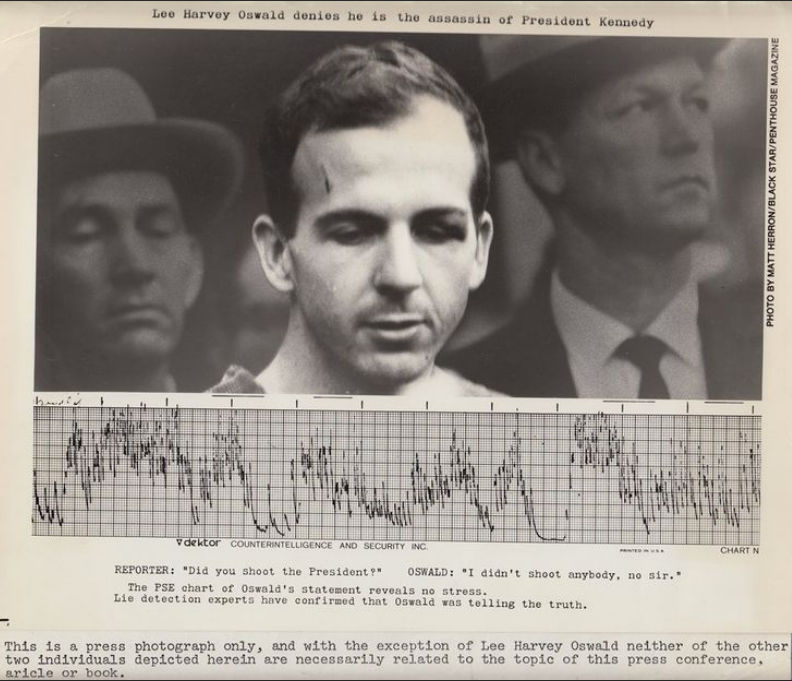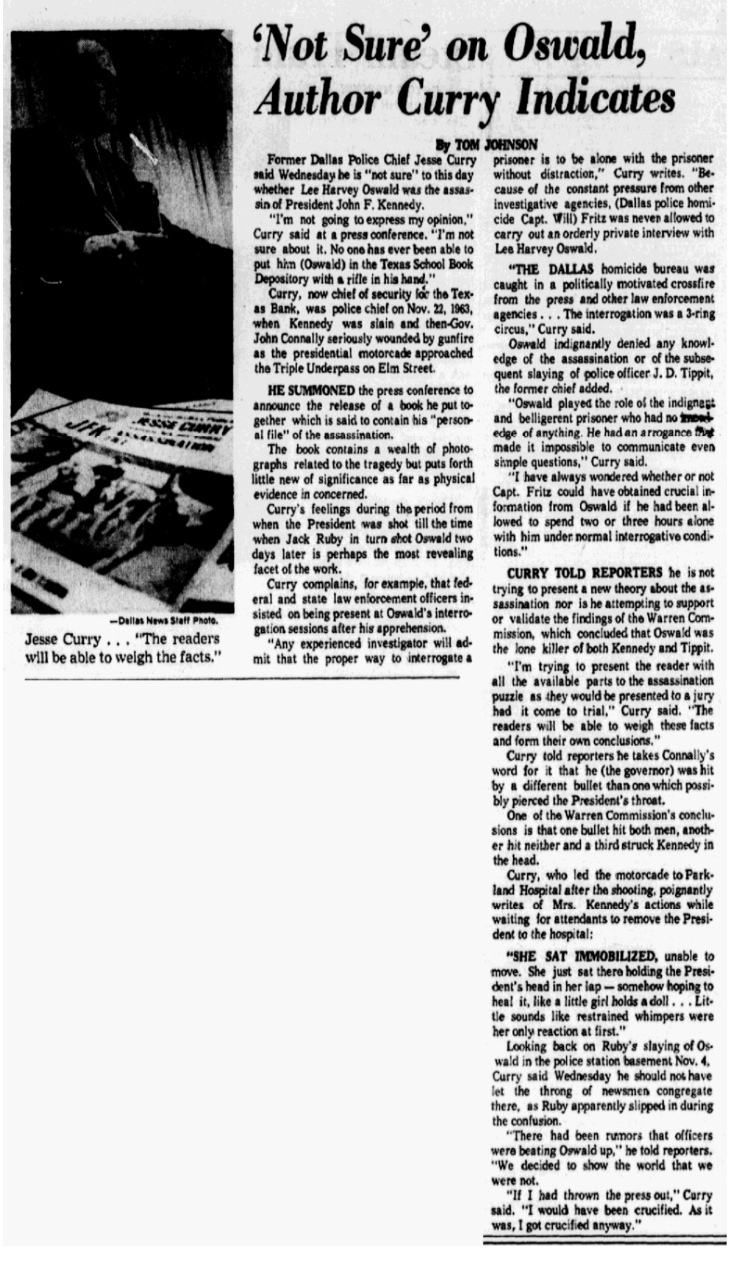Setting up HARVEY Oswald as the "Patsy"
by John Armstrong
The author believes that numerous CIA officers were involved in the assassination of President Kennedy. The most likely conspirators include Richard Helms, Allen Dulles, James Angelton, E. Howard Hunt, and in particular David Atlee Phillips.
The author believes that Phillips, together with E. Howard Hunt, were the two people most responsible for planning and creating situations and events designed to "set up" HARVEY Oswald as the "patsy." A brief overview of the following events shows how HARVEY Oswald's activities were orchestrated and manipulated in order to blame him as the assassin, and blame Cuba/Castro as his sponsor. In the author's opinion, it was David Atlee Phillips and E. Howard Hunt who gave instructions to HARVEY Oswald, through associates Guy Bannister/David Ferrie in New Orleans and Jack Ruby in Dallas, in order to make it appear as though HARVEY Oswald was a strong supporter of Castro/Cuba and preparing to kill JFK. If the American people could be convinced that Oswald, as an agent of Castro/Cuba, was responsible for assassinating JFK then these CIA conspirators were convinced that a retaliatory US military invasion of Cuba would follow.
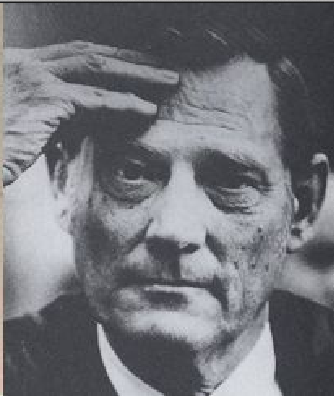 |
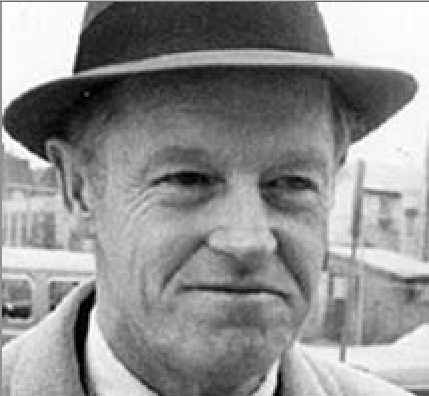 |
| David Atlee Phillips |
E. Howard Hunt |
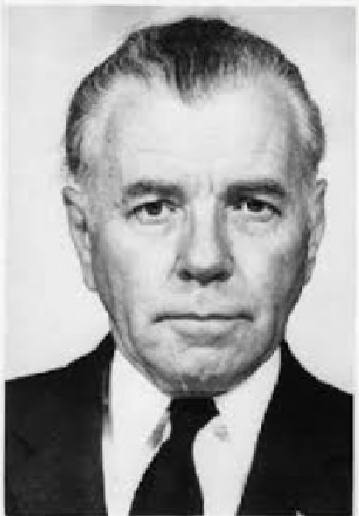 |
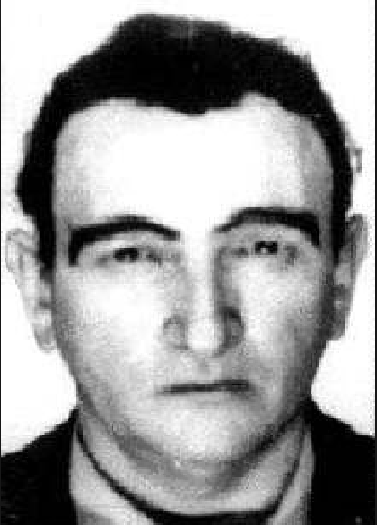 |
| Guy Banister |
David Ferrie |
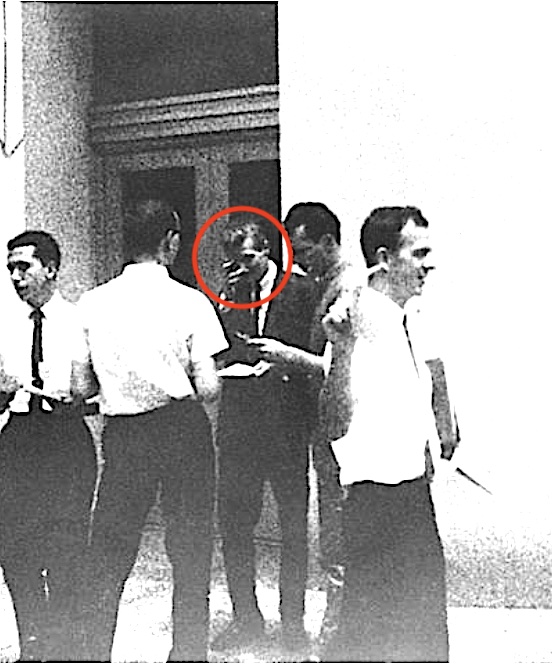
2) for HARVEY Oswald to begin working undercover for the FBI as an informant (allegedly to identify and report on Castro supporters), with help and support from Guy Bannister. HARVEY Oswald's employment as an FBI informant, however, was a ruse that was cleverly implemented for a specific purpose. That specific purpose was to insure that 5 months later, when HARVEY Oswald was accused of killing JFK, the Bureau would cover up any and all connection to Oswald and to his (CIA) sponsors. It is important to remember that during the time HARVEY Oswald was in New Orleans, in the summer of 1963, LEE Oswald and Jack Ruby were seen together on numerous occasions in Dallas, TX. The following FBI report lists an address for LEE Oswald in Ft. Worth in July, 1963 when HARVEY and Marina were living in New Orleans.

NOTE: In 1965
former President Gerald Ford wrote in his book, Portrait of the
Assassin, that in January 1964, members of the Warren Commission were
called to an emergency meeting by Chairman Earl Warren. The Attorney
General of Texas, Waggoner Carr, told J. Lee Rankin (Warren Commission
General Counsel) that the accused assassin of President Kennedy (the
"patsy," HARVEY Oswald) was an undercover FBI informant. All Texas
officials (including Waggoner Carr and Dallas District Attorney Henry
Wade) who had knowledge of this allegation were immediately, and
secretly, summoned to Washington, DC. They met with J. Lee Rankin, WC
staff members, and advised that (HARVEY) Oswald was hired by the FBI,
assigned undercover-agent number 179, paid $200 per month, and was on
the FBI payroll on 11/22/63. In Oswald's address book he had written
the name of FBI agent James Hosty, his phone number, and the license
plate number of Hosty's car. In Dallas, the Western Union office had
regularly received money orders from an unreported source for Lee
Oswald. When reporters asked Western Union to identify the name of the
sender of the money orders they refused. Neither the Dallas Police, the
Dallas District Attorney's office, nor the Warren Commission dared to
ask Western Union to provide the name of the sender. Reporter Joe
Golden wrote in the Philadelphia Inquirer (12/8/63) that the FBI had
attempted to recruit Oswald in September, 1963. Reporter Lonnie Hudkins
wrote in the Houston Post (1/1/64) "Oswald Rumored as Informant for
U.S" and quoted Dallas DA Henry Wade: "It may be true, but I don't
think it will ever be made public." According to reporters, the FBI
soon asked witnesses not to talk to reporters about evidence they might
have relating to the Oswald matter. When reporters contacted witnesses
they were told, "Well, the FBI told me to keep my mouth shut."
During the time HARVEY Oswald was in New Orleans, from May thru September, 1963, Jack Ruby and LEE Oswald were seen together on numerous occasions in Dallas, TX. In the author's opinion it was during the summer of 1963, in Dallas, when preparations were made whereby LEE Oswald would impersonate HARVEY Oswald for the purpose of setting up the former Russian-speaking "defector" as the accused assassin of President Kennedy--a perfect "patsy." According to employees of Jack Ruby's Carousel Club, LEE Oswald often drove Ruby's car during the summer of 1963. Cliff Shasteen, a barber and Irving City Council member, said that (LEE) Oswald drove Ruth Paine's station wagon to Hutchinson's Grocery Store and to his shop for a haircut every other week beginning in late August, 1963 (HARVEY Oswald, his daughter June, and 7-months pregnant Marina were then living in New Orleans). (LEE) Oswald was seen by many people, in several different locations, driving a car in the summer of 1963. LEE Oswald likely showed his driver's license to employees of Downtown Lincoln Mercury when he test drove a new Mercury Comet. LEE Oswald likely showed his driver's license when he applied for auto insurance at the Tower Agency, and showed his driver's license to Fred Moore on the morning of 11/22/63 when he purchased beer at the Jiffy Mart. LEE Oswald had a valid Texas driver's license, which was returned to the Texas Department of Public Safety (TDPS) soon after the assassination. Several employees of the Texas Department of Public Safety (drivers license section) saw and handled LEE Oswald's pink Texas driver's license, yet why the Warren Commission never requested information from the TDPS pertaining to Oswald remains unknown.
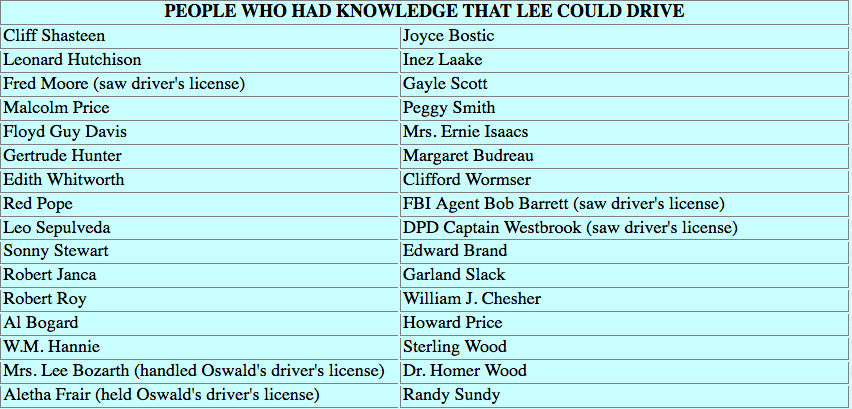
HARVEY Oswald was never known to own a car, drive a car, nor did he have a driver's license. When Ruth Paine was interviewed by the Warren Commission she discussed teaching Oswald how to drive her car. However, she insisted that (HARVEY) Oswald did not know how to drive and had never driven her car. If (HARVEY) Oswald never drove a car, yet LEE Oswald drove Mrs. Paine's station wagon to Cliff Shasteen's barber shop and to Hutchinson's Grocery Store (among other places), then Mrs. Paine's involvement with both HARVEY and with LEE is undeniable. Shortly after the assassination, and before HARVEY Oswald's arrest had been made public, Dallas Police arrived at the Paine's. Det. Gus Rose said, "Just as soon as we walked up on the porch, Ruth Paine came to the door." She said, "I've been expecting you all." Almost everything used to convict HARVEY Oswald in the public mind came from the Paine's garage. During Warren Commission testimony Ruth Paine described Oswald's demeanor on one occasion in New Orleans. She said, "It was more like HARVEY that I had seen him before." Years later Marina was asked if she still associated with Ruth Paine, and she replied, "No." When asked why not, Marina said that her decision was based upon the advice of the Secret Service, who told her that if the public found out the "connection between me and Ruth and the CIA" it would look very bad. Marina was then asked, "In other words, you were left with the distinct impression that she (Ruth Paine) was in some way connected with CIA?" Marina replied, "Yes."
June-August, 1963. In New Orleans HARVEY Oswald was most likely given instructions by either Guy Banister or David Ferrie, at the behest of David Atlee Phillips and E. Howard Hunt. CIA asset Gordon Novel was a close friend of both Banister and Ferrie. In a lawsuit brought against Playboy magazine, for publishing Jim Garrison's claim that Novel worked for the CIA, Novel testified in deposition that Guy Banister worked under CIA operative David Atlee Phillips. When Oswald was handing out FPCC literature, together with Charles Hall Steele (an FBI informant), in front of Clay Shaw's International Trade Mart, photographs and movies were taken by FBI informants. Within hours of the assassination these photographs and movies were shown on national television, for the purpose of showing (HARVEY) Oswald's connection to Castro/Cuba. CIA agent William Gaudet had an office in the Trade Mart and watched as HARVEY Oswald passed out the FPCC literature. Gaudet told the HSCA "I observed Banister talking to LHO in front of the International Trade Mart.... I saw him (Banister) in deep conversation with Lee Harvey Oswald on Camp Street. They were leaning over and talking and it was an earnest conversation.... It seemed to me Banister wanted Oswald to do something." Following the assassination of JFK Gaudet said, "The man who probably knows as much as anybody alive on all of this... is... I still think is Howard Hunt." Oswald was soon confronted by anti-Castro Cubans, and taken into custody by police. While in jail HARVEY Oswald asked to speak with an FBI agent and was soon talking with FBI Agent John Quigley.
August, 1963. Antonio Veciana was head of Alpha 66, a large and CIA supported anti-Castro group. Veciana reported to a CIA contact he knew as "Maurice Bishop," whom he had met with "hundreds of times." CIA agent Ron Crozier, who worked in Cuba under Phillips, said that Phillips sometimes used the code name "Maurice Bishop." In late August or early September, while HARVEY Oswald was in New Orleans with his family, Veciana was in Dallas, TX. At the Southland Building, only a few blocks from Jack Ruby's Carousel Club in downtown Dallas, Veciana saw "Bishop" talking with a man he later recognized as Lee Harvey Oswald. Veciana stood nearby and watched as the two men talked for about 15 minutes. Phillips later confirmed, under oath in deposition, that he was in Dallas in early September, 1963. The name "Bishop" (likely a reference to David Atlee Phillips) appears in Jack Ruby's notebook with telephone number RI 87991. It was during this time (Sept, 1963) that Jack Ruby and LEE Oswald were seen together on numerous occasions in Dallas, while HARVEY Oswald was with his family in New Orleans. The author believes that after HARVEY Oswald returned to Dallas (in early October, 1963) it was David Phillips who gave instructions through Jack Ruby, to LEE Oswald, who would then impersonate HARVEY Oswald for the purpose of setting him up as a "patsy," the man accused of murdering JFK.
Following the assassination of JFK Dallas Constables Billy Preston and Robbie Love were contacted by a woman who gave her name as "Mary." Mary told the constables that she had a box of documents that she was holding for her Latin boyfriend. The letters mentioned Oswald and Ruby, and she wanted to get rid of the box because she was scared. The constables picked up the box and took it to their office where they, together with constables Mike Callahan and Ben Cash, examined the contents. Cash and Preston remembered a receipt from a motel near New Orleans with Oswald and Ruby's name. The receipt showed that several long distance telephone calls were made to numbers in Mexico City, which were later found to be those of the Cuban and Russian Embassies. Other handwritten notes recounted a plan to assassinate Kennedy during the dedication of a lake or dam in Wisconsin. Cash said, "We kept quiet about this. We figured it would be handled on a higher level. And when it didn't come out, we thought at that time possibly they (Warren Commission) thought that kind of information tying it into the Cubans or Russians couldn't be released at that time because it might put us in World War III."
Following the assassination Chuck Boyles, night talk show host on KLIF radio in Dallas, received a call from an unidentified woman who said that she worked as a telephone operator in the WHitehall exchange in Dallas. The woman explained that her company had records of many calls between Jack Ruby and Oswald. The woman explained that when Ruby tried to call Oswald, and was unable to get through because the pay phone Oswald was using was busy, he would call the operator and tell her that his call was an emergency. The operator would then interrupt the call, ask the callers to get off the line, and make a record of the call as required by the phone company. The woman said that Ruby used this trick so frequently that she remembered his name and his numerous calls. The area manager, Raymond A. Acker, took phone company records to the Dallas Police Department after the assassination and told police they were proof of calls between Ruby and Oswald. Acker said that after he gave the records to the Dallas Police, he was told to go home and keep his mouth shut. In the author's opinion Jack Ruby was in close contact with LEE Harvey Oswald in the summer and fall of 1963, but never had any contact with HARVEY Oswald.
Sept, 1963. On Labor Day weekend, when HARVEY Oswald and his family were on holiday with the Murret's at Lake Pontchartrain, a young man and a tall, latin man, drove to the home of Robert McKeown, who lived in Baytown, TX.
Six year earlier, in 1957, McKeown was living in Baytown, a small community adjacent to Kemah, Texas where Jack Ruby collected and stored guns and ammunition for shipment to Mexico. In nearby Houston, at the Shamrock Hotel, McKeown met Fidel Castro, with whom he began a long and close relationship. McKeown soon began delivering large quantities of arms, munitions, and supplies to Mexico for delivery to Castro. He was paid with CIA cash bundled in Pan American Bank of Miami wrappers. Castro himself piloted his boat to Mexico, picked up the arms from McKeown, and returned to Cuba. By the end of 1957, McKeown was furnishing Castro's forces with large quantities of supplies and had become a close, personal friend of Castro.
A year later, on February 18, 1958 the FBI's San Antonio office notified US Customs that Robert McKeown had purchased a yacht, and was probably using it to transport arms and supplies to Cuba. US Customs soon seized McKeown's vessel and it's cargo of two million dollars worth of arms while en route from Patterson, LA to Houston. His home was raided by agents from the bureau of Alcohol, Tobacco and Firearms (ATF), who found a small arsenal of weapons. McKeown was charged with conspiracy to smuggle guns and related equipment to Castro's revolutionary forces in Cuba. Eight months later he went to trial, was given a 60-day jail sentence, and five years probation. McKeown accepted his sentence and quietly retired from gun-running and Cuban affairs.
A year later, on April 15, 1959, 33-year-old Fidel Castro visited New York City and Washington, DC. On April 28, he flew directly to Houston, Texas in his personal plane. Castro had one reason and one purpose for his trip to Houston--to meet with Robert Ray McKeown, his close personal friend who had supplied Castro with large quantities of armaments during the revolution.The April 28th edition of the Houston Chronicle newspaper reported Castro's visit and included a photograph of Castro and McKeown on the front page titled "Castro and the Gunrunner." Castro was grateful for McKeown's help, and tried to persuade McKeown to return to Cuba. Castro told reporters that if McKeown would return to Cuba he (Castro) would give McKeown, "A post in the government or perhaps franchises." McKeown thanked Castro for his offer, but declined, explaining that he was still on probation for running guns to Cuba and could not leave the United States.
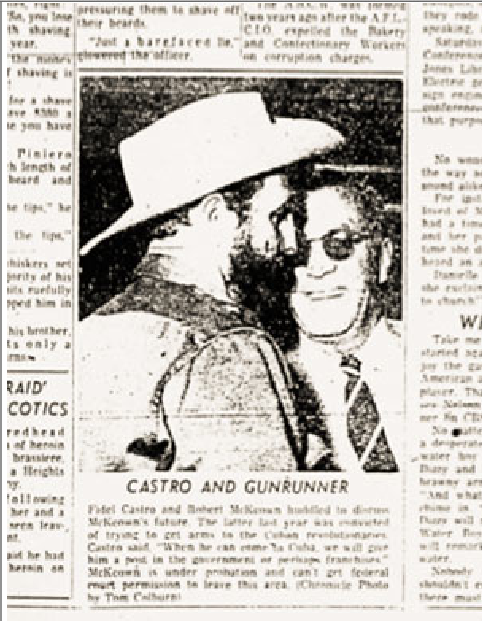
The FBI was well aware of Robert McKeown and his gunrunning activities. In a letter to the Warren Commission, J. Edgar Hoover wrote, "The neutrality and registration act investigation related primarily to the activities of Carlos Prio Socatras who, with a number of others including McKeown, was involved in a conspiracy to ship arms, munitions, and other war material to Fidel Castro to assist him in his efforts to overthrow the Batista regime in this investigation. McKeown, however, was never interviewed by the Warren Commission.
August 31/September 1, 1963--Labor Day weekend. While HARVEY Oswald and his family were on holiday with the Murret's at Lake Pontchartrain, a young man and a tall, latin man, drove to the home of Robert McKeown, who lived in Baytown, TX. The young man, accompanied by a tall latin man, identified himself as "Lee Harvey Oswald," and said he was willing to pay a lot of money (up to $10,000) for four .300 Savage automatic rifles with telescopic sites. McKeown, who was still on a 5 year probation for illegally shipping and selling armaments to Castro said, "I don't want to get involved with no rifles." The young man left and returned a short time later and pleaded with McKeown to sell him rifles. Once again McKeown refused to sell rifles to Oswald, and suggested he buy the rifles at Sears Roebuck for $35 each. McKeown's friend, Sam Neil, was an electrician who worked for NASA. Neil was visiting McKeown when Oswald arrived and discussed purchasing rifles. Neil said this man was Lee Harvey Oswald. Had McKeown sold one or more rifles to Oswald (LEE Oswald), then one of these rifles would likely have been found on the 6th floor of the Book Depository by police. The rifle would be traced back to McKeown, and the clear implication would be that Castro, thru McKeown, had supplied the rifle that Oswald used to murder JFK.
n 1978 McKeown was interviewed by the HSCA for several hours, and was asked about his personal relationship with Fidel Castro. McKeown responded by telling the HSCA about an incident involving some of his brother's friends who, while fishing, had strayed into Cuban coastal waters. The men were arrested by the Cuban militia and imprisoned. McKeown's brother pleaded with him to contact Castro and explain the situation. McKeown placed one telephone call to Castro and the prisoners were released immediately. Such was the close relationship between "Castro and the Gunrunner." McKeown and his gun running were well known to the FBI, the CIA, and later to the HSCA. When asked by the HSCA to identify the source of the guns that he had supplied to Castro, McKeown replied, "Well mostly from the Mafia and from the, er, I can't afford to tell you (McKeown chuckled)... because I would jeopardize myself... my life." The HSCA interviewer asked, "Still, 15 years later (after the assassination)?" McKeown responded, "Yes." There is no doubt that McKeown's source of guns and supplies was the CIA. A multi-hour tape recording of the HSCA interview with McKeown is available at the National Archives. Click here to view Dan Rather's interview of McKeown and Neil. Begin at 50:22.
Sept-Oct 3, 1963. To further connect HARVEY Oswald to Cuba/Castro it was important to show that he had direct contacts with Cuba. E. Howard Hunt, when interviewed by Cigar Aficianado magazine, said that he was acting temporary Chief of Station (CIA) during Oswald's alleged visit to Mexico City (Sept 25 - Oct 3). Hunt's close friend, and fellow CIA agent David Phillips, was then Chief of Cuban Operations, Chief of Psychological Operations, and supervised the CIA's surveillance posts in Mexico City (photographic surveillance of the Russian and Cuban Embassies). Pulse activated surveillance cameras automatically took photos of anyone and everyone who approached the entrance to the Cuban Consulate and/or the Russian Embassy. Yet there was not a single photo taken of HARVEY Oswald at any time. When questioned as to why no photographs were taken of Oswald during his visit to the Cuban Consulate and the Russian Embassy, David Phillips testified that the CIA's surveillance cameras were not working. The author believes that HARVEY Oswald was never in Mexico City, and that the entire "Oswald in Mexico City" was a hoax planned and perpetuated by David Atlee Phillips for the purpose of showing a close relationship between Oswald and Castro/Cuba.
Post assassination. Phillips provided the Warren Commission with information that Oswald was at the Russian and Cuban embassies in Mexico City, then later admitted that the information he had provided was false. Following the assassination Gilberto Alvarado Ugarte told the US Embassy in Mexico City that he observed a negro with red hair inside the Cuban Consulate pay Oswald $6500 to kill President Kennedy. Phillips allegedly interviewed Ugarte and reported, "This officer was impressed by Alvarado....the wealth of detail Alvarado gives is striking." Phillips described Alvarado as "quiet, very serious person, who speaks with conviction." A few days later Phillips admitted his involvement in fabricating this story, which was designed to show Cuba/Castro's involvement in JFK's assassination. Phillips then told Antonio Veciana that he would like to recruit Veciana's cousin, Cuban Consulate employee Guillermo Ruiz, and pay him a large amount of money to say that Oswald was a Cuban agent and that he had seen Oswald receive money in the Cuban Consulate. A few days later Guillermo's wife was walking from her house to the Cuban Embassy. As she approached the Consulate she saw a large amount of US currency scattered on the sidewalk. A Mexican person standing nearby said, "Lady, this money is yours." She became frightened and ran into the Cuban Embassy where her husband was working. A few days later Phillips' plan to implicate Cuba in the assassination was exposed as a hoax. In total there were more than a dozen fabricated plots/plans, created or directed by Phillips, that were intended to link Cuba/Castro to the assassination of President Kennedy. There is no credible evidence that proves HARVEY Oswald was ever in Mexico City, nor had any contact with Cuba. In the author's opinion Oswald's alleged visit to Mexico City was a hoax, created entirely by Hunt and Phillips in a failed attempt to show HARVEY Oswald's alleged support and allegiance to Castro/Cuba.
September, 1963. Mrs. Lou Hayes was a lifelong resident of New Orleans and a close personal friend of Warren Commission member Hale Boggs. At 2:00 PM Mrs. Hayes boarded a public service bus at South Claiborne Avenue and Carrolton. A few stops later a young male boarded the bus and sat next to her. Without introducing himself the young man said, "I just got back from Cuba....I saw Castro, he's a fine guy, a great person." The young man got off the bus at Broadway and South Claiborne and Mrs. Hayes never saw him again. On December 11, 1963 Mrs. Hayes wrote a letter to Attorney General Robert Kennedy and told him of her encounter with Oswald. Her letter was forwarded to Hale Boggs, who then wrote a letter to Warren Commission General Counsel J. Lee Rankin and advised, "Mrs. Hayes is a thoroughly responsible person and information contained in her letter of December 11, 1963 should be checked out thoroughly by the Commission." Mrs. Hayes was never interviewed by the WC.
September, 1963. While Oswald was supposedly en route to Mexico City on a bus, “Leon” Oswald and two other men visited prominent Cuban dissident Sylvia Odio at her apartment in Dallas. One of the men who accompanied Oswald phoned her the following day and said that Oswald wanted JFK assassinated following the Bay of Pigs.
In New Orleans Oswald was living with his wife and child and, according to Marina, he came home every night. This created a conflict when LEE Oswald was impersonating HARVEY Oswald in Jackson, MS (seen with Ferrie/Clay Shaw), in Baytown, TX (trying to buy rifles from Robert McKeown), or meeting with David Atlee Phillips at the Southland Building in Dallas (seen by Antonio Veciana). HARVEY Oswald was in New Orleans, while at the same time LEE Oswald was in Jackson, MS, Baytown, TX, and Dallas, TX. When HARVEY Oswald returned to the Dallas--Ft. Worth area in September, it was important that he live alone, apart from Marina. LEE Oswald would then be able to impersonate HARVEY and create events and situations that made it appear as though he (HARVEY) was preparing to assassinate President Kennedy. For the next two months, while LEE was impersonating HARVEY, the conspirators arranged for HARVEY to be employed in the Texas School Book Depository and live alone. He rented a very small room at 1026 N. Beckley, in nearby Oak Cliff, and rode a bus to work. Every other weekend HARVEY would ride with 19-year-old Wesley Frazier to visit his wife and child, who lived in the home of CIA asset/agent Ruth Paine (Irving, TX). Frazier, who was recently unemployed and living in Huntsville, TX., had just re-located to Irving, TX, and was living with his sister and her family--only two blocks from Ruth Paine's home. Frazier managed to get a job at the TSBD just a few weeks before HARVEY Oswald was hired, and drove his 1954 Chevrolet from Irving to Dallas every day (15 miles one way). Oswald's boss at the TSBD was Bill Shelley, who I believe was a co-conspirator.
During the weeks leading up to 11/22/63 HARVEY Oswald, unbeknownst to him, was constantly being watched. As the man who was being "set-up" to be accused of assassinating the President of the United States, nothing could be left to chance. At his rooming house he was watched and observed by a fellow room mate, probably Herbert Leon Lee. In Irving, TX he was watched by Ruth Paine. At the TSBD he was watched by Bill Shelley.
October 3, 1963. During the afternoon HARVEY Oswald visited the Texas Employment Claims office at 2210 Main Street in Dallas and met with Interstate Claims Clerk Henry McClusky. While HARVEY Oswald was meeting with McClusky, at 3:39 PM, a man who spoke broken Spanish and broken English telephoned the Soviet Embassy in Mexico City. The man identified himself as Lee Harvey Oswald and asked if his visa had been processed. On October 3, when HARVEY Oswald was in Dallas, 4 books were returned to the New Orleans Public Library that were checked out on September 19 with Oswald's library card (Goldfinger, Thunderball, Ape and Essence, Brave New World).
October 12, 1963. At 6:45 AM, LEE Oswald arrived at Ciff Shasteen's barbershop for a haircut, once again driving a 1955 Chevrolet stationwagon that Shasteen thought belonged to Mrs. Paine. HARVEY Oswald was in his room at Mary Bledsoe's house in Oak Cliff until he received a phone call at 10:00 AM. The caller advised that Oswald's wife was going to have a baby, so Oswald left the rooming house and rode a city bus to Ruth Paine's house in Irving, TX.
October 16, 1963. HARVEY Oswald began working at the Texas School Book Depository in Dallas. During the next five weeks, while HARVEY Oswald worked Monday thru Friday at the Book Depository and spent most weekends with his wife and daughters in Irving, TX, LEE Oswald was impersonating him in order to make it appear that HARVEY Oswald was making plans to assassinate President Kennedy.
October 25, 1963. At 10:00 AM Aldeane Magee, who lived in Baton Rogue, LA., received a phone call from a man who asked to look at an apartment she had available for rent. A few hours later Mrs. Magee met this man, who identified himself as Lee Harvey Oswald, and was accompanied by his wife and baby in an older model light colored Chevrolet station wagon. Oswald said he was from New Orleans, where he had worked for a coffee company. While looking through the apartment Oswald asked Mrs. Magee if the apartment had good locks, explaining that he had a collection of guns that he didn't want stolen. As Oswald returned to his car he said, "I hear that Kennedy's going to make a tour down to the Southern states." He then said he was going to "look around" and drove off.
October 26, 1963. While HARVEY Oswald spent the day with his wife and two daughters at the Paine residence in Irving, TX, an Oswald impostor (LEE Oswald) visited the Sports Drome Rifle Range in Dallas. Malcolm Price told the WC, "...it was just about dusky dark and he came in an old model car, I would judge it was possibly a 1940 or 1941 model Ford....he was by himself and I have heard that he couldn't drive, but he was driving that day because he was the only one in the car, and he came down and inquired if there was anyone there that could set a scope, a telescope on a rifle, and I told him that I could, and he said, well-he had one that he had mounted and boresighted but it hadn't been fired on a range and that he would like to have it sighted in, so I went down and set up a target on a hundred yards... he (Oswald) fired three shots after I got it set to where I could fire a pattern, with three shots in a bull's eye... and he (Oswald) fired three shots and he scored bull's eye with all three-a very tight pattern."
October 31, 1963. While HARVEY Oswald was working at the TSBD a young man visited the 18 story Statler-Hilton Hotel on Commerce St. in Dallas. The young man filled out an employment application and said he was married with two children, had recently been employed as a printer, completed the 10th grade, and spoke Russian. When the receptionist (Laura Layfield) asked the man where he learned to speak Russian, he became very angry and said it was none of her business (LEE Oswald, who filled out the employment application, could not speak Russian). The young man quickly grabbed his employment application and left. Laura remembered the incident clearly and never forgot the man's name was Oswald.
Late October-early November, 1963. Doorman Leander D'Avy worked for the Court of Two Sisters Restaurant in New Orleans, and was looking for his boss, Gene Davis, to collect his paycheck. A waiter told D'Avy that Davis was in the storeroom above the restaurant. D'Avy entered the storeroom, asked Davis for his paycheck, and saw David Ferrie, LEE Oswald, and four unidentified men standing nearby. It is important to realize and understand David Ferrie knew LEE Oswald from the Civil Air Patrol in June-July, 1955 and met and knew HARVEY Oswald while working with Guy Banister in 1963.
November 2, 1963. An Oswald impostor (LEE Oswald) visited Morgan's Gun Shop in Fort Worth and caused a well-remembered commotion. Later that same day an Oswald impostor (LEE Oswald) visited the Downtown Lincoln Mercury dealership where he test drove a car recklessly at high speed. He told the salesman that cars were built better in Russia, but that he would soon come into a lot of money and come back to buy a new car. The salesman wrote down the name "Lee Harvey Oswald" on a business card.
November 6 or 7, 1963. While HARVEY Oswald was working in Dallas at the Book Depository, an Oswald impostor (LEE Oswald), driving a 1957 or 1958 blue and white Ford, with wife and two children, visited the Irving Furniture Mart (Irving, TX) looking for a gun part. Gertrude Hunter, a friend of store owner Edith Whitworth, referred the young man to the Irving Sports Shop, one block to the east. After the assassination Mrs. Hunter and Mrs. Whitworth were shown photographs of Lee HARVEY Oswald handing out FPCC literature in New Orleans. Neither woman recognized him as the man who visited their store. Mrs. Hunter was then shown two other photographs of Lee HARVEY Oswald and she said "they resembled" or "could look like him." Mrs. Whitworth told the WC, "That little girl, the oldest one, isn't she a dark headed girl, and at that time she wore-she had her bangs cut... she had straight hair and she had little bangs in front...." However, 22 month old June Oswald had blond hair--not dark hair. When questioned by the Warren Commission Marina Oswald emphatically denied ever visiting this store.
November 8, 1963. A young man walked into the Tower Insurance Office and told agent Edward Brand that he wanted to buy automobile insurance. The young man identified himself as O.H. Lee and showed Brand his Texas drivers license. Oswald told Brand he had just moved from San Antonio to Dallas, he lived across the street in a rooming house owned by Mrs. A. C. Johnson, and was looking to buy a car. After Brand told the young man to return after he purchased a car, the young man left.
NOTE: two weeks later, on the morning of November 22, LEE Oswald again showed his drivers license to Fred Moore, store clerk at the Jiffy Store, near the TSBD, when buying two bottles of beer. After the assassination numerous employees at the Texas Dept of Public Safety saw, handled, and discussed LEE Oswald's drivers license. TSBD employees said that Oswald's drivers license and file was soon confiscated by "a federal agency." The Warren Commission had several FBI reports of witnesses who saw LEE Oswald's drivers license, and they knew of numerous witnesses who saw LEE Oswald drive a car:

The Warren Commission failed to ask the Texas Dept of Public Safety if Oswald had a drivers license, but why? The obvious reason is that one or more people in the Commission knew that LEE Oswald had a drivers license, knew this information would expose the two Oswald's, and knew such information would lead directly the agency that created and sponsored them--the CIA.November 8, 1963. At 5:30 PM a young man arrived at Hutchinson's Grocery Store in Irving, TX and presented a $189.00 check to store owner Leonard Hutchinson. The young man said, "I would like to get this check cashed." Mr. Hutchinson remembered the check was made payable to "Harvey Oswald," and drawn on a counter-check form. After Hutchinson told Oswald that he did not cash two party checks the young man left. Marina told the Warren Commission she did not believe her husband ever had a check for $189.00. And employees of the Book Depository were always paid in cash (Oswald was paid $104.41 every two weeks, in cash). That same evening LEE Oswald and a 14 year old boy arrived at Cliff Shasteen's Barber shop at 6:50 PM. Shasteen was putting away his barber tools and getting ready to leave for a high school football game when he saw Oswald drive to his shop in a car. This was LEE Oswald's last visit to Shasteen's barber shop.
November 9, 1963. A letter, typed on a typewriter that allegedly belonged to Ruth PaIne, was mailed to the Consular Division of the Embassy of the USSR in Washington, DC (click here to read letter). The letter described his (Oswald's) recent meeting with Comrade Kostin in Mexico City, FBI agent James Hosty's meeting with him (Oswald) on November 1, a reference to "their unfinished business," and requested information as to the status of his (Oswald's) Soviet entrance visa. The purpose of the letter, when intercepted and read by US authorities (through monitoring and reading of letters to the Soviet Embassy), was to show Oswald's frustration with life in the USA, his unfinished business with the Soviets, and his desire to return to the Soviet Union. This letter, however, contained enough mistakes to show that it was not written by HARVEY Oswald. Marina's maiden name was misspelled, three week old daughter Audrey's name was written incorrectly, a reference to Cuban Consul Eusebio Azcue Lopez being replaced was incorrect and, finally, incorrect information about his (Oswald's) meeting with FBI agent Hosty on November 1. The person who wrote this letter had access to confidential data about the Cuban Consulate and Russian Embassy in Mexico City, confidential information about FBI surveillance of Oswald, detailed knowledge of Oswald's Russian wife and family, and access to Ruth Paine's typewriter. One of the very few people in the world who had access to such information was David Atlee Phillips.
November 9, 1963 (Saturday). While HARVEY Oswald was at the Paine residence with his wife and children, an Oswald impostor (LEE Oswald) visited the Sports Drome Rifle Range for a second time. The owner of the range, Floyd Davis, recalled that his good friend, Malcolm Price, Jr., sighted in a rifle for Oswald. Davis told the WC, "He (Price) said Oswald was there on the 9th and the 10th....This Mr. Price did say that Oswald was in an old model Chevrolet when he was out there... and Mr. Price helped him sight that rifle in. Helped him sight the scope in on the rifle, and he had two comments to say about that rifle, sir... he said that the markings, all but the serial number had been filed off this particular rifle... and he said that the scope was the clearest scope that he had ever seen for a small scope."
November 10, 1963 (Sunday). While HARVEY Oswald was at the Paine residence with his wife and children, an Oswald impostor (LEE Oswald) visited the Sports Drome Rifle Range for a third time. Garland Glenwell Slack, a 58 year old heating contractor and real estate developer, was at the rifle range when Oswald arrived. Slack told the WC, "Oswald was there the 10th.... The 10th was the turkey shoot. And I contacted him three or four times trying to get him to pay a dollar and get in the turkey shoot. Ten men were paying a dollar to shoot, and he commented he could win the turkey but he didn't have the dollar." Malcolm Price also saw Oswald and said, "They had a turkey shoot and I went down to participate in a turkey shoot and he was sitting in booth 6 or 8 and was firing on a 100-yard line with a heavy bore rifle and I didn't talk to him then...."
November 14, 1963. At 12:40 PM Jack Ruby came into the New Port Motel in Morgan City, LA. Ruby asked Corrine Villard, whom he had known for 15 years, to talk with Pete Guarisco, who was not available. As Corrine talked with Ruby she noticed a man sitting at a table about 15 feet away. Corrine said, "After we finished talking he walked out of the motel toward his automobile. He walked out of the side door under the carport and Oswald got up and walked out the front door. They met at the car and both got in." When shown photos of Oswald Corrine said, "I am sure that this is the man that was in the motel with Ruby that day." Once again, Jack Ruby and LEE Oswald are together--only eight days before the assassination.
November 15, 1963. While HARVEY Oswald was working at the Book Depository an Oswald impostor (LEE Oswald) went to the Southland Hotel parking garage (Allright Parking Systems) and applied for a job. Oswald asked the manager, Hubert Anderson Morrow, how high the Southland Building was and if it had a good view of downtown Dallas. Morrow wrote down the man's name as "Lee Harvey Osburn," but was quickly corrected when the young man said, "No, my name is Oswald." Two fellow employees, Emmett Montgomery and Charley Dabbs, also remembered Oswald when he applied for a job.
November 16, 1963. LEE Oswald's fourth visit to the Sports Drome Rifle Range. At 3:00 PM Dr. Homer Wood and his 13 year old son, Sterling, drove to the Sports Drome Rifle Range. As Sterling began sighting-in his rifle in booth #4 a man walked up and entered booth #5. Dr. Wood told the Warren Commission, "So they fired several rounds, and after they would fire three or four rounds, then the keeper out there would say let's go look at our targets, and we would go down and I would look at my boy's target and he wasn't doing so good, but the second round we went down there and we noticed this fellow's target to our right, and my boy made a statement, 'Daddy, this fellow is not having much trouble.' So I did notice his target, and most of his shots was within the target, but there were a few that was outside the target, from an inch to 2 inches outside of it." Dr. Wood said, "And as we came back to shoot again, I talked to him (Oswald) and I said, 'Sir, is that a 6.5 Italian carbine?' And he said, 'Yes it was.'" After the assassination Dr. Wood and his wife saw Lee HARVEY Oswald on TV and he said, "Honey, that looks exactly like the fellow that was sitting next to Sterling at the rifle range." Within an hour a photograph of Oswald appeared on the TV screen, which young Sterling Wood saw, and said "Daddy, that is the fellow that was sitting next to me out on the rifle range."
November 17, 1963. While HARVEY Oswald spent the entire day in the rooming house at 1026 N. Beckley, an Oswald impostor (LEE Oswald) visited the Sports Drome Rifle Range for the fifth time. Malcolm Price was shooting in booth #9 and recognized Oswald in the adjoining booth (#8). Price asked Oswald if his gun was still sighted-in properly and Oswald replied, "It is shooting just fine." Price told the Warren Commission, "I handled it--it was a Mauser-type rifle... it's strictly a military rifle and it's patterned after the German Mauser.... I looked for a brand name so I could see approximately where it was made, and the only thing that I could find on it was a serial number." Attorney Liebeler asked, "Is this the same kind of scope that you saw on the rifle?" Price replied, "I believe it was a Tascosa, since I examined it--it was a Japanese made scope." However, the scope on the rifle found on the 6th floor of the TSBD was stamped "Ordinance Optics." After Price finished looking at Oswald's scope he (Price) left, and the booth was soon occupied by Garland Slack. Soon there was an altercation. Floyd Davis told the Warren Commission, "Mr. Slack come to me and was complaining about someone shooting his target.... So there was two young fellows... in booth No. 8.... I went to see these fellows... and was giving them heck about shooting at the wrong target."
November 20, 1963. While HARVEY Oswald was working in Dallas at the Book Depository, an Oswald impostor (LEE Oswald) was hitch-hiking on the R.L. Thornton Expressway in Oak Cliff, and carrying a 4 foot long package wrapped in brown paper. The hitchhiker was picked up by Ralph Leon Yates and soon introduced himself as “Lee Harvey Oswald.” He told Yates the long package contained curtain rods and then showed Yates a photo of himself holding a rifle. Oswald asked Yates if he thought the President could be shot from a high-rise building with such a rifle. Yates, quite perplexed by the young man's question, kept silent. As they approached downtown Dallas the young man asked to be dropped off at the corner of Elm and Houston, across the street from the Texas School Book Depository (where Russian-speaking HARVEY Oswald was working).
November 20, 1963. While HARVEY Oswald was working at the Book Depository, three people arrived by car at the Redbird Airport, five miles south of downtown Dallas. When the car stopped at American Aviation a heavy-set man and woman got out of the car and approached the owner, Wayne January. They wanted to rent a 310 Cessna, asked how far the plane could fly, how far it could travel without refueling, and said they wanted to fly to the Yucatan Peninsula on the afternoon of November 22. Mr. January got a close look at the third person who was waiting in the car. After the assassination, when Oswald's photo appeared on television, January said the man was Lee Harvey Oswald.
November 20, 1963. Two days before the assassination, on Wednesday, a package was mailed in Irving, TX to "Lee Oswald, 2515 W. 5th St, Irving, TX." The package was not delivered on Thursday because of insufficient postage (which is an indication the package was "dropped" into a mail box instead of taken to a postal clerk to be weighed). A "notice of attempted delivery" card was left by the postman in the Paine's mailbox (notice of $.12 postage due), which was found by police the day after the assassination among HARVEY Oswald's possessions. So, HARVEY Oswald received the attempted delivery card with $ .12 postage due, but did not receive the package.
Following the assassination Irving parcel post carrier Harold Reed heard from co-workers that the Irving Post Office was holding a package for Lee Oswald. This package was held at the post office for nearly two weeks until finally, on December 4, it was "discovered" by Irving Postmaster C.G. Twiley in the "Nixie Section." The Nixie Section was for letters and packages with unknown addresses. This package was a brown padded mailing envelope postmarked "Irving, Tex 5:30 AM," with no legible date. A gummed label, with the handwritten words "Lee Oswald, 601 W. Nassau Street, Dallas, TX" was affixed to the envelope directly above the handwritten words "Irving, TX" that were handwritten on the mailing envelope (see below). The gummed label, affixed to the mailing envelope, was placed directly over the original handwritten name and address on the brown mailing envelope. The author believes this package was originally mailed to Lee Oswald, 2515 W. 5th, Ivring, Texas, but not delivered because of $.12 postage due. If the original handwritten address on the envelope was NOT Lee Oswald, 2515 W. 5th, Irving, TX., then how would the Irving post office know to leave the $.12 postage due notice at this address?
Following the assassination a gummed label, with the non-existent address of 601 W. Nassau St., Dallas, TX, was affixed to the mailing envelope. No effort was ever made to remove the gummed label, and the package and contents soon disappeared. When opened by postal authorities the package was found to contain a folded brown paper bag that was opened at both ends. The bag was very similar in appearance, color, and texture to the brown paper bag found on the 6th floor of the Book Depository that the Warren Commission said was used by Oswald to carry the Italian rifle into the building. The author believes that HARVEY Oswald's uncharacteristic visit to the Paine's on Thursday evening, instead of on Friday evening, may have been to pick up this package. If HARVEY Oswald had received this package, and removed the contents, then he would have unwittingly placed his fingerprints on the paper bag. This bag could then have been placed on the 6th floor of the TSBD for police to find with the intact fingerprints of HARVEY Oswald. This package, however, was in the Irving post office on 11/22/63, and the long paper bag found on the 6th floor did not contain Oswald's fingerprints.
NOTE: On November 20 Ralph Yates picked up a hitchhiker who was carrying a 4 ft long brown paper package that he (the hitchhiker) said contained "curtain rods." On November 22 HARVEY Oswald rode to work with Wesley Frazier, and allegedly told Frazier that the brown paper package laying on the back seat of Frazier's car contained "curtain rods." The author cannot help but wonder if the brown paper bag, found in the package mailed to Oswald, was supposed to have been used by Oswald to carry "curtain rods" to the Book Depository on the morning of November 22. If the brown bag mailed to Oswald had been used for this purpose, then Oswald would have been seen by Frazier and other TSBD employees carrying a long brown paper bag into the Book Depository, which would later be found Dallas Police and covered with Oswald's fingerprints.

By this time, only two days before the assassination, many people had mistaken LEE Oswald for HARVEY Oswald, and the "setting up" of HARVEY as the patsy was nearing completion. The conspirators had managed to portray Lee HARVEY Oswald as a strong supporter of Cuba/Castro through FPCC leaf-letting, radio interviews, and his alleged visit to the Cuban Consulate and Russian Embassy in Mexico City. They prepared and sent a letter to the Russian Embassy that described Oswald's dissatisfaction with American life, a reference to their "unfinished business," and asked about the status of his (Oswald's) Soviet entrance visa. The conspirators were able to show that HARVEY Oswald had allegedly purchased a mail order rifle and, after repeated visits to the Sports Drome Rifle Range, was a very capable marksman. They had (LEE) Oswald apply for jobs at high rise buildings in downtown Dallas. They had him ask a local Dallas man, Ralph Yates, if he (Yates) thought the President could be shot from a high rise building with a rifle. (LEE) Oswald pointedly asked Mr. Yates to drive him to the corner of Elm and Houston in downtown Dallas. When they arrived, across the street from the Book Depository where HARVEY Oswald was working, (LEE) Oswald got out of the vehicle and was last seen carrying his 4 ft long package, which he told Mr. Yates contained "curtain rods." Two days before President Kennedy's visit to Dallas, (LEE) Oswald's visit to Redbird Airport made it appear as though he was planning to flee to Cuba by renting a private airplane that could take him to the Yucatan Peninsula in Mexico, only 130 miles from Cuba. Finally, and perhaps the most clever part of setting up HARVEY Oswald as the "patsy," was establishing a close working relationship between Oswald and Guy Banister in New Orleans. In the author's opinion it was David Atlee Phillips, the CIA's Chief of Psychological Operations, who instructed Guy Banister to arrange for HARVEY Oswald to be employed by the FBI as an informant while promoting the Fair Play for Cuba in New Orleans (according to Gordon Novel, Banister worked under Phillips). This clever and well thought out plan guaranteed the FBI would not only deny Oswald's FBI employment, but would cover up any and all connections he may have had to any government agency. A few days after the assassination the FBI had completed a lengthy report that named Lee HARVEY Oswald as the lone assassin of JFK. Phillips' plan worked to perfection. HARVEY Oswald was blamed for killing JFK and Officer Tippit, even though he shot neither man, and the government coverup continues to this day.
Now, who conveniently met HARVEY Oswald and his wife, and within a few months shared her house with the Oswald family? Who wrote on a calendar "LHO purchase rifle?" Who conveniently managed to get Oswald a job at the Book Depository? In whose garage was the Manlicher Carcano rifle allegedly stored? In whose house and garage was nearly all of the evidence found that linked Oswald to Mexico City? In whose garage were the backyard photos found? And who, during a phone conversation with her estranged husband shortly after the assassination said, "We both know who is responsible." Who was this person?
November 22, 1963. David Atlee Phillips, according to his brother James Phillips, was in Dallas on the day JFK was assassinated. In the summer of 1988, as Phillips was dying of lung cancer, he telephoned his brother James. During their conversation James asked David, "Were you in Dallas on that day?" David said "Yes," whereupon James quickly hung up the phone (click here to read Jan, 2003 email to Gary Buell from Shawn Phillips, son of James Phillips). In July, 1986 Phillips told former HSCA investigator Kevin Walsh "My private opinion is that JFK was done in by a conspiracy, likely including rogue American intelligence people."
November 23-24, 1963. Following the assassination of JFK, while stalking HARVEY Oswald, Jack Ruby told friends and employees that he could be reached through KLIF Radio. Jack Ruby and Ft. Worth native David Atlee Phillips were both close friends of Gordon McLendon, owner of radio station KLIF in Dallas. Phillips and McLendon attended school together in Ft. Worth. When Phillips founded the Association of Former Intelligence Officers (AFIO), an organization for retired CIA agents, McLendon was one of the founding charter members. In 1972 an undercover Cuban intelligence agent met with a man who identified himself as "Harold Benson." After a few drinks the subject of President Kennedy's assassination came up. Benson told the agent that he had visited the slain President's grave and had "peed" on it. The Cuban agent later identified a photograph of David Atlee Phlllips as "Harold Benson."
During the seven weeks prior to the assassination of President Kennedy LEE Oswald was in various locations identifying himself as "Lee Harvey Oswald," often showing disdain and contempt for President Kennedy, while actively setting up HARVEY Oswald as the man who would be blamed for killing JFK. During these impersonations HARVEY Oswald was either at his rooming house, working at the TSBD, or at the Paine house in Irving, TX. It was American-born LEE Oswald who, through instructions from David Atlee Phillips and/or E. Howard Hunt, who was responsible for LEE Oswald "setting up" the Russian-speaking HARVEY Oswald as the lone assassin of President Kennedy. When HARVEY Oswald told reporters "I didn't shoot anybody, no sir.... I'm just a patsy" he was telling the truth, which has been confirmed by voice stress analysis.
